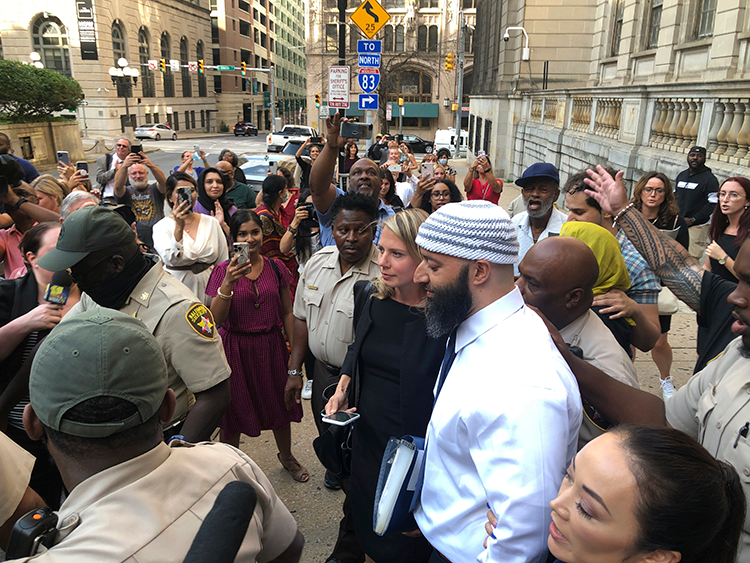Murder conviction of Adnan Syed of 'Serial' podcast fame is reinstated because of notice issue

Adnan Syed, center, leaves a Baltimore courthouse on Sept. 19, 2022, after his murder conviction was vacated. That conviction was reinstated Tuesday. Photo by Brian Witte/The Associated Press.
Adnan Syed's February 2000 conviction for the murder of his ex-girlfriend has been reinstated because the victim's brother got insufficient notice of a hearing last year in which a judge vacated the conviction.
In a March 28 opinion, the Appellate Court of Maryland said the brother of victim Hae Min Lee had only received one business day’s notice of the hearing.
The New York Times and the Washington Post are among the publications with coverage.
The appeals court said the judge must hold a new “legally compliant, transparent hearing” on the prosecution motion to vacate Syed’s conviction. And the victim’s brother, Young Lee, must be given enough notice to allow him to attend in person. The appeals court paused its mandate for 60 days, however, to give the parties “time to assess how to proceed.”
Syed’s case has received extensive media attention because it was featured on the Serial podcast.
Judge Melissa M. Phinn of Baltimore had vacated Syed’s conviction Sept. 19, 2022, after prosecutors said the defense was never given information about two “alternative suspects,” including one who had threatened to kill Lee and make her “disappear.”
The victim’s brother, Young Lee, appealed, arguing that the short notice gave him insufficient opportunity to be heard in violation of a victims’ rights law. He had attended the September hearing on Zoom and said the motion to vacate the conviction made him feel “betrayed” and “blindsided.”
In October 2022, prosecutors announced that they were dropping the charges and would not retry Syed, citing additional DNA testing that excluded Syed.
The judge entered an order dropping the charges Oct. 11, 2022, while Young Lee’s appeal was pending and just three business days after Young Lee asked the appeals court to stay further proceedings in the case. Syed’s response to the stay motion was not yet due when the judge acted.
“Under these circumstances,” the Appellate Court of Maryland said, “we conclude that the nol pros was entered with the purpose or ‘necessary effect’ of preventing Mr. Lee from obtaining a ruling on appeal regarding whether his rights as a victim’s representative were violated. …
“Allowing a nol pros in this circumstance gives the state a mechanism to insulate a defective proceeding from appellate review, and it prevents victims from receiving the rights to which they are entitled.”
According to the Washington Post, Syed was hired by Georgetown University after his release. He is a program associate who provides research for a class called “Making an Exoneree.”



